Gaining new clients is among the toughest and most expensive business tasks whether you’re a real estate agency, a law firm, or a thrift store.
But getting new business is often one of the hardest parts of the job—most real estate agents go through a lot of trial and error just to find a repeatable, successful way of doing it. It can take years (not to mention hours of every working day)—and if you’re a smallish real estate agency, you’re probably prospecting without the luxury of having a dedicated team.
But fortunately, there are some great time-saving techniques and approaches when it comes to real estate prospecting. Want to get more real estate clients, in a more efficient way? Keep reading.
In this article, we’ll cover:
Download your free real estate prospecting playbook, featuring 9 prospecting letter/message templates! 🚀
How real estate agents typically get new leads
Today, the world of real estate is uncertain and stormy. Ever since 2020, many of the typical real estate prospecting techniques like open houses and sponsored events are either out of bounds or require a bit of modification (depending on where you live). Here’s a quick overview of the common ways real estate agents get new leads, along with each method’s pros and cons.
1. Cold calling
Cold calling is the activity of calling, messaging, or emailing a possible client to try to sell them something—without being asked by the client to do so. Real estate agents might go door to door in a new neighborhood introducing themselves and their services, or pick up the phone and go through contact lists to solicit new business:
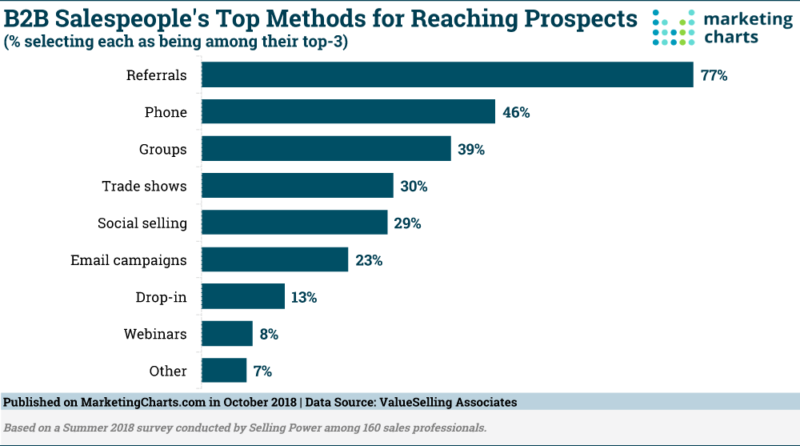
If you’re experienced, you can probably do a ton of these a day. If you’re new, you might use a script.
Agents could get these contacts by scouring the directory of a new area they are farming or mining FSBO and expired listings.
Out of all the industries, real estate is probably the most reliant (or one of the most reliant industries) on a good phone service. Clients expect to be able to reach you, at all hours. So, make sure you’re using an actual phone service (not just your regular cell phone) that has features like:
- Voicemail
- Did you know that some platforms (like RingCentral!) have features like visual voicemail (so you can read the message instead of listening to it—perfect if you’re in a meeting but want to read your voicemail), and even voicemail-to-email (since you’re always checking your email inbox anyway)?
- A mobile and desktop app (hey, sometimes you want to work at your desk, and sometimes you have to take a call on the go)
- A business caller ID—even if you’re taking calls on your personal phone
- Call forwarding
🕹️ Get a hands-on look at how some of the top real estate firms are winning new business with RingCentral by booking a product tour:
💰 You can also use this calculator to see roughly how much your business could save by using RingCentral to support your team’s communication with each other, clients, freelancers, and more.
Pros
- Cold calling is among the most successful techniques available in B2B sales. In a recent study by ValueSelling Associates, 46% of sales professionals found phone calls to be an effective method for reaching prospects, second in effectiveness only to referrals (more on that later).
- Cold calling is truly a numbers game, which means it’s easy to measure its success.
Cons
- Let’s face it. Many people don’t take kindly to cold calls, often finding them invasive—especially if the call is run awkwardly. Without a solid cold-calling strategy, this technique might make you seem overly “pushy.”
- Cold calling is time-consuming and might require you to hire someone else to help.
2. Prospecting letters/direct mail
Direct mail is a type of direct marketing that’s delivered physically to a prospect’s mailbox via post or courier. Real estate agents could send postcards, pamphlets, coupons, or just a plain and simple old-fashioned letter. It’s the IRL equivalent of email marketing.
Almost as old as modern marketing itself, real estate prospecting letters are very effective, well-received, and—surprisingly—warmly welcomed in this digital age. Millennials love them, plus a Canada Post study determined that direct mail can actually be 20% more persuasive than digital media.
Pros
- Prospecting letters can be highly personalized to the receiver, unlike other forms of marketing.
- It’s easy to miss an email but hard to miss a letter in your mailbox. Prospecting letters and direct mailers are (somewhat) less likely to be missed.
Cons
- Prospecting letters and direct mail usually cost more to produce and send in terms of time and money than their digital alternatives.
- Mailed letters reach their audiences more slowly than their digital counterparts, which can slow down marketing efforts.
3. Word of mouth
Word-of-mouth marketing is an unpaid form of promotion in which satisfied customers tell other people how much they like a business, product, or service and even recommend it to them. Sometimes, it’s intentionally elicited by the company through publicity drives and referral marketing. Other times, it’s totally organic (which is great, because that requires zero effort on your end).
It’s also one of the biggest sources of referrals. In 2018, 39% of sellers who used a real estate agent found their agents through referrals by friends or family, and 24% used the agent they previously worked with to buy or sell a home.
Pros
- There’s tons of evidence to show that people rely heavily on recommendations of trusted friends and family when choosing an agent (or purchasing any other high-value commodity), making word of mouth a rewarding area to invest in. According to the 2020 NAR Profile of Home Buyers and Sellers, 91% buyers said that they would use their agent again or recommend their agent to others.
- The returns of investing in word of mouth compound over time, as most of the work and “selling” is done by your clients… once you delight them of course.
Cons
- Getting a word-of-mouth marketing program off the ground can be a time-consuming process involving a lot of trial and error.
- It can be difficult to moderate the leads coming your way through referrals and making sure they’re right for your business.
4. Advertising
Advertising is a paid form of marketing communication distributed through various media channels to promote or sell a product, service, or idea. Real estate agents can publish advertisements on billboards, flyers, newspapers, or TV, or they can choose to go via the internet through banner ads and social media ads.
Pros
- The reach of advertising is far and wide and can go beyond your firm’s network.
- Advertising is highly customizable. You can tweak your message for different audiences, and technology now allows you to target your ads so that you reach the clients you want instead of a mass audience who aren’t interested in your product or aren’t right for your agency.
Cons
- Thanks to banner blindness, advertisements have been steadily dwindling in credibility or interest to consumers.
💡 Pro-tip:
What is banner blindness? You know when some websites have so many ads that your eyes just automatically skim over them and you don’t end up paying any attention to them? That’s banner blindness.
- Though some ads are successful enough to persuade folks to buy products, advertising is an impersonal form of communication that can do little more than spread awareness about your products and services to your prospects.
5. Open houses
The open house is a century-old practice where sellers open the doors to their homes for a period of time so that interested buyers can drop by and browse the space to get a feel for it. It’s like a live advertisement for the house itself. The house is decked up to look its best, there are usually appetizers and drinks.
You also have broker open houses promoted exclusively to the brokerage community where buying agents and selling agents can communicate.
Until there is a coronavirus vaccine readily available, live open houses might not be feasible as attendance might be too low to justify the expense. But the good news is, virtual open houses are a great alternative that offer the same lead-generating benefits!
💡 Pro-tip:
A good starting point for learning how to put on a virtual open house: use these four checklists.
Pros
- An open house is a magnet for hot leads: people who are poised to make a buying decision (or even just a real estate agent hiring decision).
- An open house allows agents to make a significant impression on prospects and communicate their strengths in person.
Cons
- Open houses are nothing less than full-blown events and take a lot of time and resources to organize.
- Open houses very seldom lead to a sale, but contribute to building and solidifying a high quality network of leads and opportunities.
6. Real estate lead generation services
Real estate lead generation platforms like Zillow and BoldLeads allow agents to buy real estate leads using predictive analytics, ad-based generation tools, or contact databases. Here’s a quick overview of such lead sources provided by fitsmallbusiness.com:
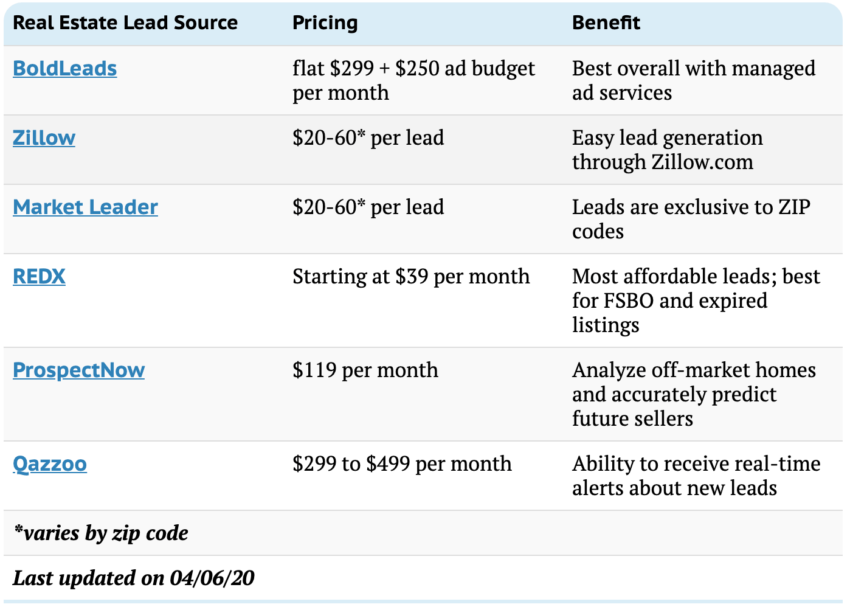
Different providers offer different types of services and specializations. For instance, REDX focuses on seller leads and also offers training to users, while Offrs offers online home evaluation tools and predictions for potential home sellers.
Pros
- Several real estate lead generation services offer contacts and a wealth of data on a platter, saving agents a lot of time they would otherwise spend manually scouring FSBOs, expired listings, and more to look for prospects to contact.
- Some of the ancillary services offered, such as lead tracking and client insights, can offer value for money.
Cons
- Some of these services can be quite expensive for small-budget firms.
7. Social media
With over 3.6 billion users worldwide spending an average of 144 minutes networking online per day, social media is rapidly transforming into a place of business and not just leisure. It’s now almost a non-negotiable, much like a website, that a company should have a social media presence to exist.
Real estate agents use social media to promote their listings, build, and maintain relationships with their clientele, and also to find new prospects. Many agents use it without any social media management software or tool to schedule their posts. The most popular platforms tend to be Facebook, LinkedIn, Instagram, and Twitter:
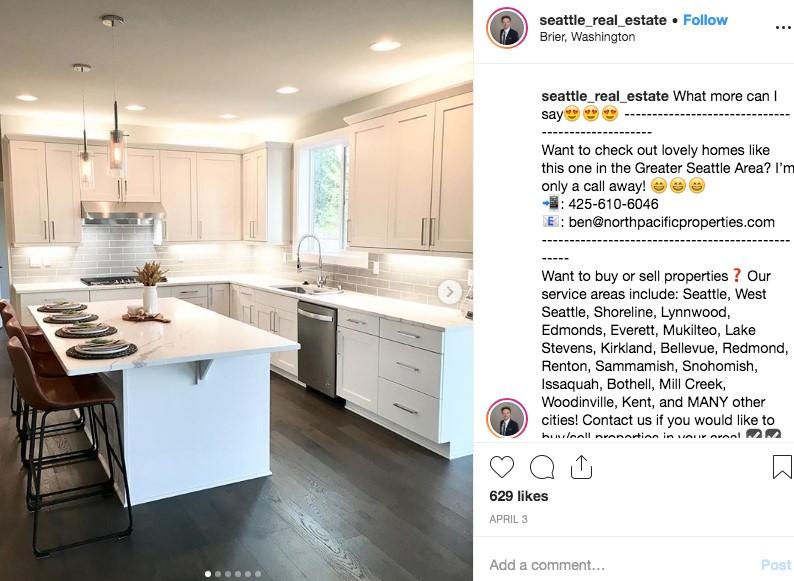
Pros
- Social media provides very high-quality leads. According to data by the National Association of Realtors, real estate agents reported that social media provided them with the highest quality of leads compared to any other technological tool.
- Social media platforms like Facebook and Instagram allow you to target your ads geographically, so you can reach audiences who are appropriate for your firm.
Cons
- To effectively make use of social media as a marketing tool, most companies hire a team. It’s necessary to post consistently and regularly in order to see results.
- The results of social media prospecting are not quantifiable—unlike with real estate referral programs or with email marketing, you cannot directly attribute your results to the effects of your online campaign.
How to prospect more efficiently
There are a bunch of real estate prospecting methods mentioned in this article and all of them are effective to varying degrees. However, a real estate agent, especially one that’s working with a small team, needs to find ways to make sure they’re prospecting efficiently as well. Here are two ways an agent can step up the efficiency of their prospecting so it’s less painful:
Set up a workflow
Real estate agents have tons of things to keep track of: paperwork, client service, prospecting, people management, and more. With something like prospecting, which consists of multiple repeatable tasks that can be streamlined and automated, workflow management can make lead generation more efficient. This will free up your time to focus on high-value prospecting activities like networking and organizing open houses.
Here are some of the tasks you can automate:
- Following up with marketing emails and missed calls.
- Scouring FSBO and expired listings through a lead generation software to find contacts and email addresses.
- Scheduling social media posts.
To manage and automate tasks, you’ll need a workflow management tool like Built.io Flow, Trello, Asana, or Zapier (For a more in depth list, read this). It may take a bit of work to set up to run smoothly, but the payoff in terms of time and money saved over months adds up. Choose your tools based on your needs and budget.
Use a powerful communications tool
As real estate agents, a massive part of your day involves communication, both in and out of office. You need a powerful communications tool that isn’t just a business phone (even though that capability is still super important). For example, you’ll need:
1. An app or software that has different communication channels in one handy interface. The RingCentral app, for instance, gives you messaging, video conferencing, and a phone system—all in one app:
2. Project or task management tools to keep you organized. The RingCentral app comes with task management built in, which means you can create and assign tasks to teammates (and yourself) right within your team conversations:
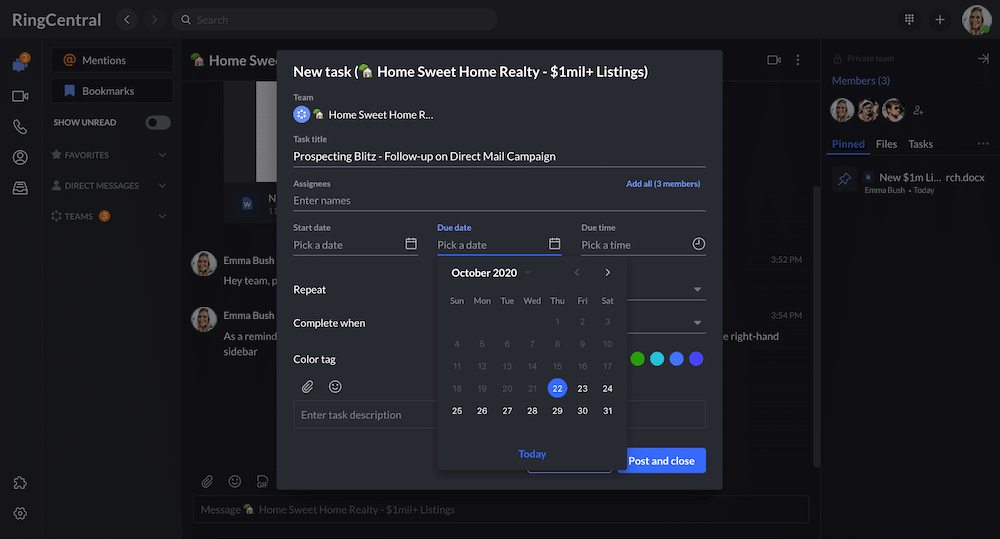
3. A CRM tool to keep track of all your clients and prospects. Ideally, it would integrate with your communication platform so that it can automatically log all your phone calls, texts, and messages made from that platform. This gives you a clear big picture view of all your client relationships, including stuff like the last time you talked to them, maybe their neighborhood preferences, and more.
For example, Fidelity Resales, a real estate broker based in Florida, integrated their phone system, RingCentral, with Salesforce. This let their sales agents dial prospects and clients directly from within Salesforce. And when clients call them, they can immediately see key details about that client and history before they even answer the phone:
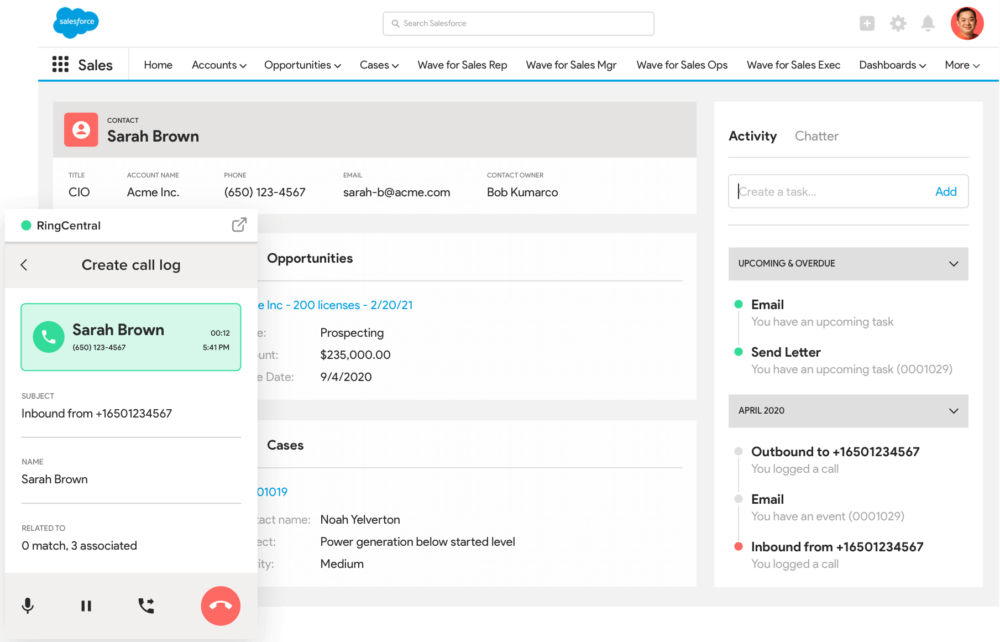
The right tools save you a huge amount of time and set you up for success.
3 best ways to generate leads in real estate
There are two broad classifications of marketing: outbound marketing and inbound marketing. Outbound marketing (also known as “push” or “interruption” marketing) involves bringing your message in front of those who aren’t soliciting it. Examples include cold calls, emails and letters, TV ads, billboards, etc. Inbound marketing is more of a slow burner. It involves setting the scene so that interested parties find your brand and see it as the solution to a problem they’re seeking to solve. Examples include open houses, referral marketing, and content marketing.
Inbound marketing is obviously the easier, more economical and more efficient way to go about things, especially if you’re a small firm or just starting out. It’s easier to convince people who already know they need you to hire you or partake in your firm’s services.
Therefore, many of the “best” ways outlined in this section will be inbound, using resources you already have, and building your capability to continue attracting leads over time and not just while you’re having a marketing push.
1. Invest in search engine optimization
Search Engine Optimization (SEO) is the process of improving the quality and quantity of traffic coming to your website through search engines like Google. Using a mix of techniques that range from coding to writing, SEO helps people find you through their searches. Just like other inbound methods, it’s a slow-burner, with results growing over time.
The goal of SEO is this. Suppose you are an agency serving the Poughkeepsie area. What you want to achieve is that whenever someone searches “real estate agent in Poughkeepsie” or “homes for sale in Poughkeepsie,” your website shows up among the first results.
You can teach yourself SEO but if you’re looking for results, your best bet is to hire someone to optimize your website for you.
Although it is likely to be expensive to do well, 52% of buyers found the home they purchased in 2019 through the internet (followed by 29% who found their home through a real estate agent). It might just be worth it.
2. Start a referral program
Remember when we discussed word-of-mouth marketing? Well, a referral program is strategically designed to encourage past customers and clients to recommend your real estate services to others. Typically, the referrer is promised an incentive when they refer a person who ends up making a high-value purchase. For instance, one of the incentives in RingCentral’s referral program is a $100 gift card for each referral who joins.
Another way to think about a referral program is through referral partnerships within the larger real estate industry such as home builders and mortgage lenders, or even divorce lawyers. You might find yourself coming across a lot of people you can refer to these firms and vice versa. Why not partner up with them and agree to refer suitable clients to one another?
There are many ways to run a referral program but the benefits are long-lasting. Once you’ve discovered what incentives resonate with your clients, you’ll find that the program becomes a “gift that keeps on giving,” adding new clients without much effort.
3. Attend—and sponsor—non-real-estate-related events
Your lead generation software and research skills can cast your net pretty wide, but to meet clients that these algorithms might miss, you’ll have to rely on pure serendipity. And if most of the time you spend is divided between the real estate office and your car, chances are you won’t get to meet too many different people and potential prospects.
The best way to do this is to sponsor events such as food donation drives and pet adoption camps—that help create positive impressions about your agency—and to attend similar events. Yoga classes, choirs, anything that you think might draw your target audience. But instead of selling from the get-go, build the relationships with your acquaintances over time so that when they need an agent, they won’t be able to think of anyone else.
And of course, virtual events count too!
Ready to refresh your real estate prospecting?
Prospecting is a real rollercoaster. After all the time and effort you put into it, there’s no real guarantee that it’ll work. Chances are you’ll need to tweak your methods and try again.
But the good news is, once your firm has achieved a certain level of credibility and maturity in the market, you won’t need to do much prospecting at all. By that time, after all the slogging, you’ll even have figured out which methods work best for you, your business and your clients. Happy clients are your best advocates, and they’ll bring you new business.
The key is to see prospecting as a long game, not as a bringer of short-term rewards. (After all, choosing a place to live isn’t a decision people make instantly.) Knowing that the results come over time can be a comforting thought when you are on your 100th call of the day. That, and having the right tools and tricks up your sleeve.
Originally published Jan 05, 2021, updated Jun 19, 2024
